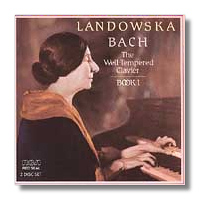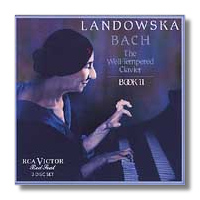
The Internet's Premier Classical Music Source
Related Links
Recommended Links
Site News
Johann Sebastian Bach
Performances of "Well-Tempered Clavier"
Book I from a Legend
If anyone deserves legendary status as a Bach keyboard performer, it's probably Wanda Landowska. Some refer to Rosalyn Tureck as the "High Priestess" of Bach keyboard performance; that would make Landowska the Queen.
For many years, I've had trouble adjusting to the sound quality of Landowska's recordings, but I've managed to overcome that issue and simply tune into the performances themselves. Although a few folks consider Landowska's Bach a relic of the past, there can be no doubt that she fully identified with Bach's idiom and gave Bach enthusiasts some outstanding live and recorded performances. The Book I recording under review comes from RCA Red Seal with a catalog number of 6217-2-RC. A very enlightening aspect of the production is that Landowska herself gives detailed descriptions of each set of preludes & fugues.
Every one of the preludes & fugues of Book I finds Landowska having much to offer. These are the very special performances:
Prelude & Fugue in C sharp major – In the Prelude, Landowska is quick, urgent, and exciting. Her handling of the broken chords is superb. Joy permeates her Fugue in C sharp minor, and the momentum is stunning.
Prelude & Fugue in C sharp minor – The depth delivered by Landowska in the Prelude is very impressive and fully conveys the bitter/sweet nature of the music. The Fugue is more severe than the Prelude; Landowska makes the adjustment beautifully with a very slow reading which strikes the heart of the music's core and my heart as well. Her rays of light in the Fugue are revelatory.
Prelude in D Major – The joy and rhythmic vitality in Landowska's Prelude is a pleasure to experience.
Prelude in D minor – An energized and foreboding interpretation of the Prelude which is one of the best I've heard.
Prelude & Fugue in E Flat Major – A magnificent prelude played magnificently by Landowska. There's inevitability to her reading which reminds me of Leonhardt at his best. Then comes the vivacious Fugue and Landowska returns to her youth.
Prelude in E Major – Landowska provides a slow paced and incisive reading excellently mixing the urgent and comforting moods.
Prelude & Fugue in E minor – In Landowska's hands, the Prelude is rich and anticipatory; then the concluding Presto section releases all the energy stored earlier. Her E minor Fugue is in Richter's league – pure dynamite with all hell breaking loose.
Prelude & Fugue in F Major – Joyfully and incisively performed by Landowska, her climax in the Prelude is thrilling to behold. Landowska's Fugue is strong, authoritarian, and vital.
Prelude & Fugue in F minor – The rays of light in the Prelude come through with great optimism in Landowska's reading. The Fugue goes well with any depressing event you might have lived through or be thinking of; Landowska's authority can not be denied as her reading is majestic, slow, and inevitable.
Fugue in F sharp major – A wonderful blend of joy and urgency permeate Landowska's interpretation; there's not a better one on record.
Prelude in F sharp minor – Landowska delivers a great prelude of perpetual motion and eerie atmosphere.
Prelude & Fugue in G minor – Supreme sadness and a wonderful gait highlight Landowska's Prelude. Her Fugue in G minor has great nobility, ceremony, and that inevitable quality so important in this fugue.
Prelude & Fugue in A Flat Major – Intense joy and excitement dominate Landowska's reading of the Prelude. The Fugue has fantastic phrasing and momentum.
Prelude & Fugue in G sharp minor – Landowska beautifully captures the bitter/sweet essence of the Prelude. The dark and dreadful emotional themes of the Fugue are delivered with authority and urgency.
Prelude & Fugue in A major – Landowska again hits the bulls-eye with a joyous and youthful Prelude. Her Fugue is on the slow side but accented strongly with a zig-zag motion that's irresistible.
Fugue in A minor – Great rhythmic vitality and authority are displayed by Landowska.
Prelude & Fugue in B Flat Major – Once again, Landowska fully delivers the energy and power needed for a piece like the Prelude in B flat major. Her performance of the Fugue, with great accenting and joy, is one of the best.
Prelude & Fugue in B flat minor – The Prelude is ever so slow and rich in emotional content; sadness and grief just drips off the performance. Her Fugue has determination written all over it, and the rays of light are exquisite.
Prelude & Fugue in B Major – There are very few artists who convey much of a sense of inevitability in performances of the Prelude, but Landowska makes it the central element of her reading. Although the pace is very slow, a deep and subtle joy permeates the performance. Her Fugue is joyous and loaded with delicious ceremonial themes.
The above is a very high percentage of wonderful readings. The others not mentioned are all very rewarding.
Landowska and Tureck are very different Bach artists. I tend to feel that Tureck covers the entire musical landscape with great poetry and incisiveness. Landowska has a much stronger sense of destination and the determination to reach there. In that regard, performers such as Gulda and Leonhardt are similar to her.
Is Landowska's WTC Book I as good as the versions from Gould, Gulda, and Tureck? At least at this moment, I prefer not to delve into that question. Suffice it to say that Landowska is one of the few Bach performers on record that give me the feeling that I am listening to Bach, not a performance of a Bach composition.
Concerning the sound quality, I had mentioned that I once had problems with sound such as provided in the Landowska recordings. I expected problems, focused on problems, and allowed the sound to interfere with my listening enjoyment. Two things got me over the hurdle. First, just the continued experience of listening to sound not up-to-date kept making it easier to live with it. Second, I decided to think of the sound as just 'different', not worse. The main aspect of the sound provided to Landowska is that it does not interfere with the listening experience. It would be great to hear her in modern sound, but we often have to settle for the next best thing as Warren Zevon put so concisely. In this case, the next best thing is superb. Also, if you've heard that Landowska's readings are perverse, odd, or out of fashion, forget it immediately. It's just nonsense; there are no perversions, just Bach.
Don's Conclusions: Landowska is special and essential. But don't expect a Tureck-type approach. Strength and determination are major components of Landowska's Bach, and she provides these qualities better than anyone else.
Copyright © 2000, 2001 by Don Satz.















